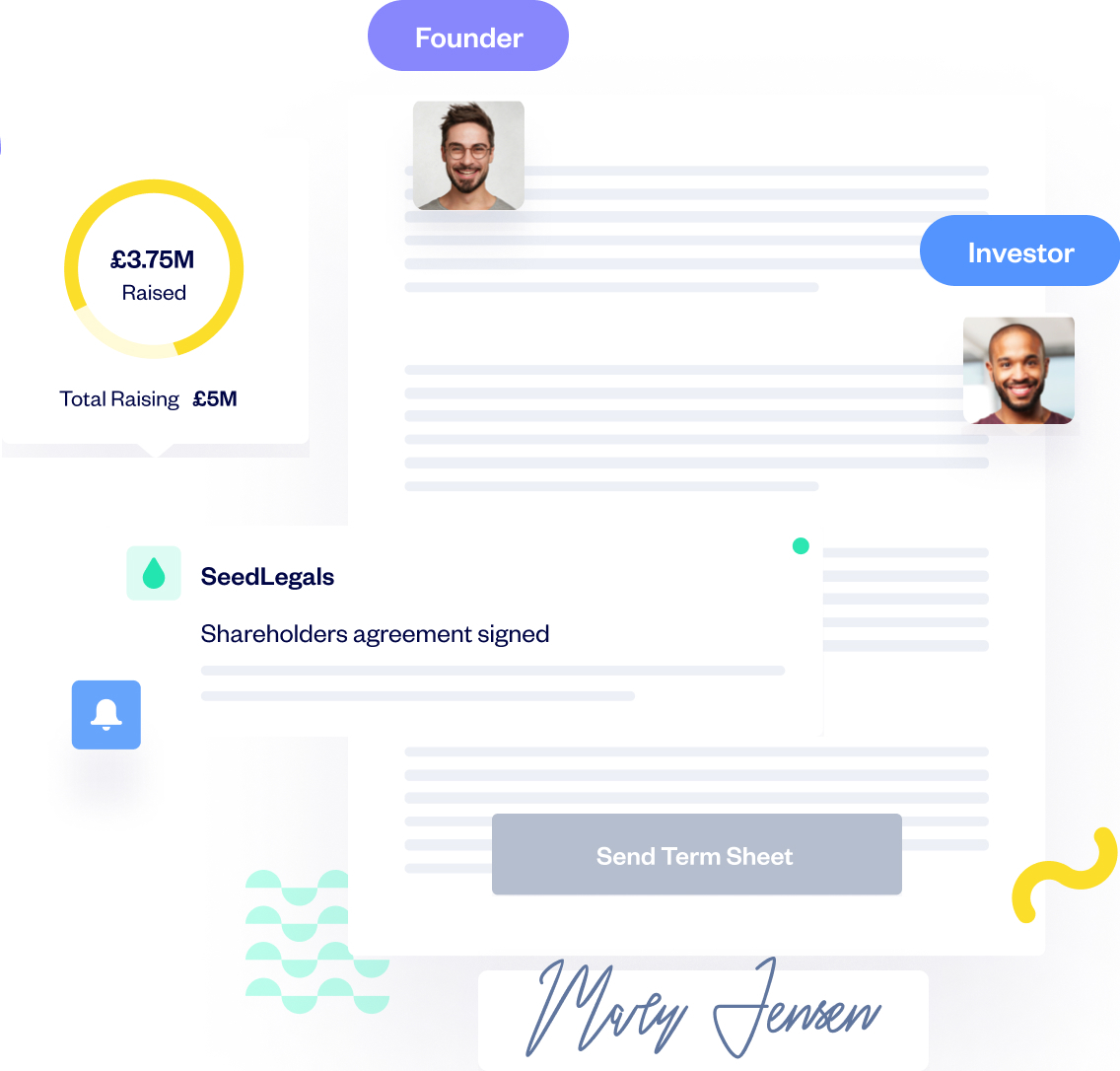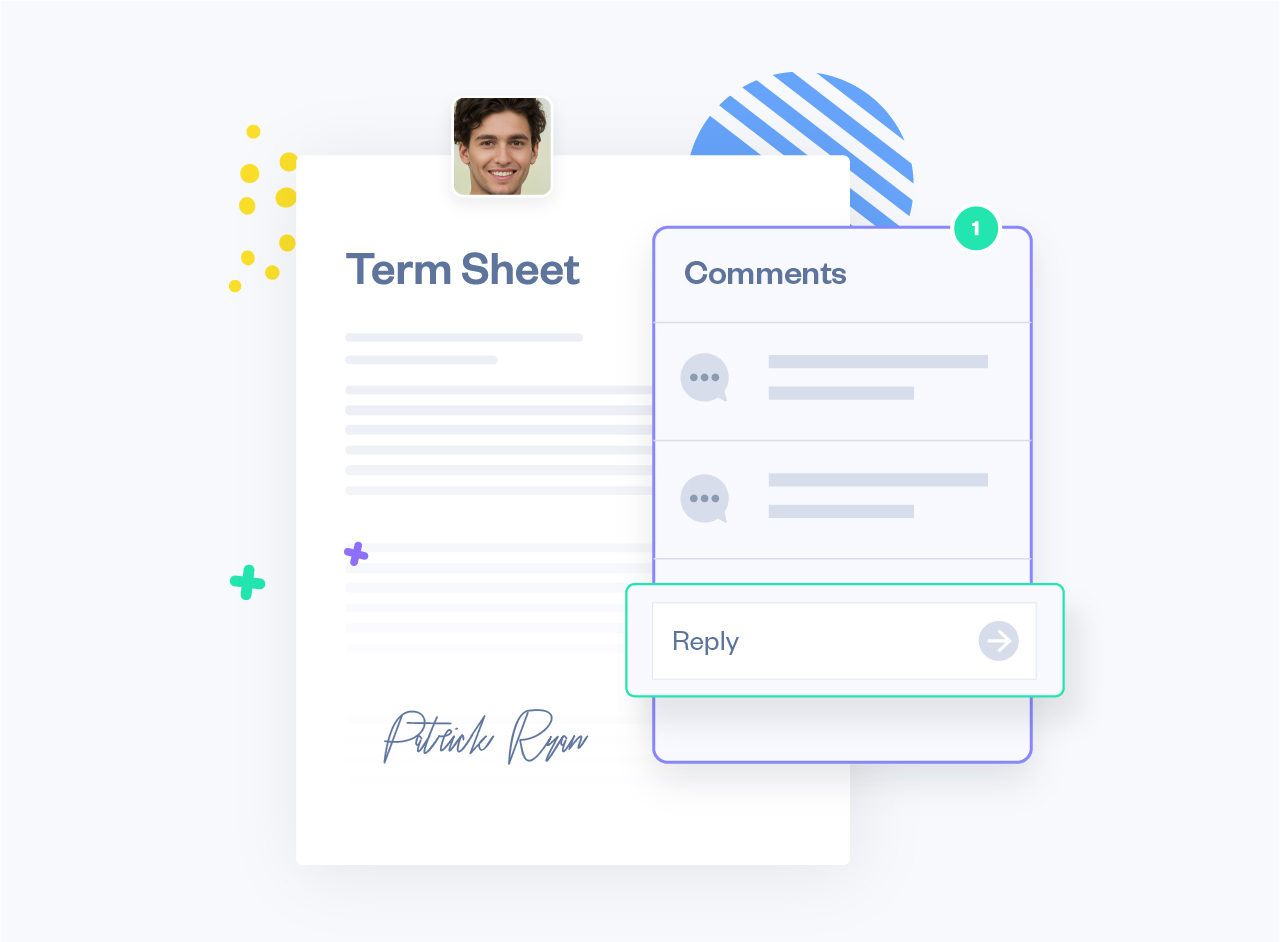10 essential legal documents for UK startups
Learn what these essential documents are for and why you need them to start, run and grow your business.
Raising your first funding round? Here’s your step-by-step guide on how to prepare, start, and close your round as easily and quickly as possible.
We’ve broken things down into three sections:
You can also check out this webinar where Anthony Rose, SeedLegals Co-Founder and CEO, and Bill Amis, Startup Advisor at Hyper, discuss raising as an early-stage founder. Get tips on pre-seed and seed funding, the importance of SEIS/EIS, and how to get the attention of investors.
If you’re properly prepared before you begin, your funding round will be much easier to navigate. Here’s how to get investment-ready.
Ever heard of pre-emption rights? What about drag-and-tag-along? Most founders don’t know about the legals involved in a funding round before they begin. Get up to speed on all the key deal terms with our UK Term Sheet explainer.
How much money do you need to raise? What’s your company valuation? These are important points to get clear on to help you craft the deal you’re looking for with investors.
Consider current market trends when you’re setting your company valuation. Early-stage companies typically aim to raise £100,000 to £200,000, often with valuations ranging from £1 million to £2 million.
You don’t have to raise all at once. Agile fundraising strategies let you access early funds quickly without waiting for a full funding round. Get started with SeedFAST to raise smaller amounts continuously.
Getting clear on your deal terms will help you build your term sheet which we’ll cover later on in this article. You can also check what is market standard with our Termometer.
The Enterprise Investment Scheme (EIS) and the Seed Enterprise Investment Scheme (SEIS) are UK government initiatives which grant private investors a significant tax break when investing in early-stage, ‘high-risk’ companies.
Most investors in the UK will only invest in these types of companies if they are SEIS/EIS compliant, so make it a priority before you even go to inventors. Make it clear that you’re offering SEIS/EIS and have Advance Assurance on your pitch deck and social media.
You can learn more in our SEIS and EIS essential read for UK startups.
Create a pitch deck that you can easily share with investors. Research how to present to investors and learn why your startup should create a data room before fundraising.
A pitch deck is a concise presentation that describes what your company does and the investment you need.
It’s your opportunity to make your company attractive to investors. Storytelling is key so make sure your pitch deck has a clear story arc, starting with the problem you’re solving, how you’re going to solve it, the market opportunity, and your amazing team.
Always include a final slide with a clear ask, explaining how much investment you need for your raise and what you’ll do with the money. Don’t forget to mention if you are offering SEIS/EIS!
Founder Agreements protect you and your co-founders and distribute equity from the start.
You can start off with a Founder’s Pledge – a lightweight version of the Founders Service Agreement used by companies at the deal stage. You can then switch to a Founders Service Agreement before you start your first funding round.
A Founders Service Agreement is an employment agreement for founders and each founder should sign one ahead of the funding round. It sets out their obligations, director duties, equity vesting schedule, non-compete clauses and more.
Founder Agreements help protect the company if a founder decides to leave. They can save you a lot of headache and reassure investors that the company will remain stable even if things don’t go to plan.
You can create and customise all these documents in minutes on SeedLegals, using our automated workflow. You’ll also have a funding expert by your side to help you every step of the way.
A company’s capitalisation table – cap table for short – shows allocated shares in the company and any share options.
The cap table shows anyone who wants to know – in particular investors – who owns the business and how the founders have organised ownership and financing, and prepared for possible exit strategies. It’s one of your most important records.
You can build and manage your cap table on SeedLegals – it’s automated and simple to use. Our automatic cap table builder:
IP assignments ensure that your company owns its intellectual property. They’re another important way of protecting yourself and everyone who’s contributed to your product or idea should sign an IP Assignment. Investors will check this as part of their due diligence.
Create funding round documents in minutes and get a feel for our workflow.
You can find investors by researching VCs and angel syndicates, networking on LinkedIn and going to events where you can meet investors.
To find VCs and angels who invest in your sector, use Google and try these databases:
Take a close look at the VC’s criteria to make sure you’re a good fit before you approach them. And it usually isn’t worth approaching a VC firm which has invested in one of your competitors because most prefer not to have competing companies in their portfolio.
When you think you’ve found a good fit, give yourself the best chance of getting a response by looking for mutual connections on LinkedIn who could provide a warm introduction to investors. If you have to do cold outreach, personalise your messages with references to specific articles, tweets or investments made by the investor to show you’ve done your research.
Set the tone for negotiations by leading with your term sheet.
A Term Sheet is a non-legally binding agreement that summarises the key deal terms of the funding round. It’s one of the most important negotiation tools between founders and investors.
Read our article What is a term sheet? to understand the purpose of this document and key deal terms you need to know.
If you have your term sheet ready before you pitch to investors, you can speed up your fundraising and follow opportunities immediately.
Easily negotiate deal terms with investors via document comments on SeedLegals. Not sure what requests are OK and what to push back on? Ask our experts.
You’ve found the right investors, they’re excited to invest in your company but the deal isn’t signed yet. Agreeing your deal is a delicate dance – there are a few important legal docs involved and there’s usually some back and forth between founders and investors.
Making this part of your funding round as streamlined as possible will save time, energy and money for your investors and yourself.
After negotiating, founders and investors will come to an agreement on the deal terms and both parties will sign the Term Sheet.
SeedLegals makes it quick and easy to create, negotiate and sign your Term Sheet. You can generate the template in minutes, easily edit your terms and swiftly move through negotiations with live commenting.
When you’ve finalised negotiations, all parties can e-sign the Term Sheet and it can be stored for future reference on the SeedLegals platform. On top of this, you’ll also have unlimited support from a dedicated funding specialist who can answer your questions and support you throughout the process.
Sign employment and advisor agreements with anyone you add to your team. SeedLegals makes it easy to create and customise team agreements.
You’re nearly there – these final steps are the most important. If you need help understanding them, a SeedLegals funding expert will be happy to answer your questions over live chat, email or video call.
You can easily create all the documents listed in this section on SeedLegals. All you need to do is answer the prompt questions and fully customised documents will be automatically generated for you.
The Disclosure Letter is a document that describes every warranty in detail, to ensure everybody is on the same page, and that your investors don’t come asking for their money back due to something being undisclosed. The letter includes things like company debt, any pending litigation, exactly what your IP ownership entails, etc.
If you need to share documents with investors as part of the disclosures, you can upload them to the Data Room on SeedLegals. Learn more about this feature in Deal data room: securely share documents with investors.
The Shareholders Agreement outlines how the company should be run and shareholders’ rights. The Shareholders Agreement needs to be signed by the new investors and all existing shareholders who have voting rights.
When you incorporate your company with Companies House, the Articles of Association will be created for you.
The Articles of Association are the constitutional rules of your company which explain how decisions are made. Most companies in their early stages use the Model Articles of Association instead of preparing their own custom articles.
When you do your funding round with SeedLegals, we’ll create new Articles for you that better reflect how your company works.
Hold a board meeting to approve the funding round, then create a Board Resolution based on the minutes from that meeting. You can hold your board meeting after the Shareholders Agreement has been finalised and before you’ve received the first funds.
The Board Resolution documents your board meeting where the board approves this funding round. The SeedLegals Board Management feature makes it easy to create your Board Resolution.
The Shareholders Resolution needs to be circulated to your existing shareholders to approve the funding round. It generally needs to be signed by at least 75% (by number of shares held) of voting shareholders.
Complete this document after the Shareholders Agreement has been finalised and before you’ve received the first funds.
Investors deposit the money into your company’s bank account. If you’re using SeedLegals to do your funding round, you can use the Funds Tracker to track the money you’ve received.
As each investment comes in, go to the Funds Tracker section on your funding round page, and enter the date that each investment was received. This will help you keep track of who to chase and it’ll help us automatically date your share certificates and know when to close the round.
When you’ve received funds from investors, make sure to update your share register. This is a legally required document that all UK companies must keep. It’s a record of all the active and former owners of a company’s shares. Learn more in our article Shareholder Register: what is it and how to create one.
An SH01 is an official form that you must file with Companies House when you issue new shares in your UK company. The form is titled ‘Return of allotment of shares’, and you’d need to file this form to give notice about shares issued after incorporation.
After your round is closed, send your SH01 form, the Articles, and the Shareholders Resolution to Companies House within 15 days. If you’re using SeedLegals, you can ask your dedicated funding expert to check the documents before you send them.
Share certificates act as proof of ownership of shares in a company. A company issues share certificates to anybody who owns shares in the company. You can create your own standardised share certificate, which should include:
When you use SeedLegals for your funding round, you can issue share certificates automatically by clicking the ‘Issue Share Certificates’ button after all your funding round documents are signed.
Before you close the round or hit the ‘Issue Share Certificates’ button, message us using the online chat bubble and/or contact your investment expert and we’ll check everything and close the round for you. It’s all part of our service and a necessary step to ensure that everything is 100% correct.
Want to know more? Hit the chat button in the bottom right corner or book a call with a member of the SeedLegals team.











